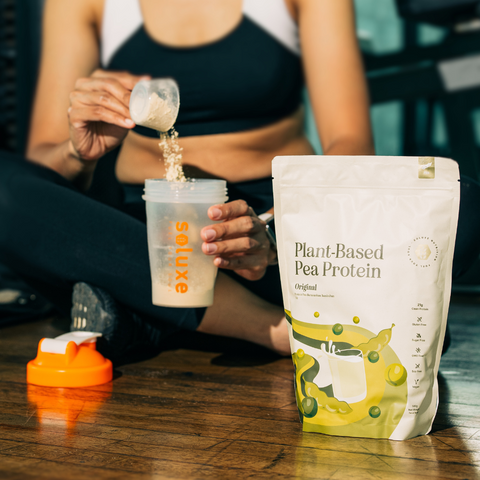As we age, maintaining strong joints and muscles becomes increasingly important for overall health and mobility. For many seniors, getting an adequate amount of protein can be challenging, especially if they have difficulty chewing meat.
However, there's a solution that's easy to incorporate into their daily routine: protein powder. In this article, we'll explore how protein powder can benefit senior adults who are looking to support their joint and muscle health.
The Importance of Protein for Seniors
As we age, our bodies undergo changes that can lead to muscle loss and decreased joint flexibility. Protein plays a crucial role in maintaining muscle mass and supporting joint health. However, many seniors struggle to consume enough protein through their diet alone, especially if they have dental issues or difficulty chewing meat.

How Protein Powder Can Benefit Senior Adults
Protein powder offers a convenient and easily digestible source of high-quality protein for seniors. With just a scoop of powder mixed into a drink or smoothie, seniors can quickly and easily increase their protein intake without the need to chew meat.
Research Backed Benefits of Protein Powder
Numerous studies have shown the benefits of protein supplementation for seniors. One study published in the Journal of Nutrition found that older adults who consumed protein supplements experienced significant improvements in muscle strength and function compared to those who did not supplement with protein.
Another study published in the Journal of the American Geriatrics Society found that older adults who consumed higher amounts of protein had better overall physical function and a reduced risk of mobility limitations.

Benefits of Protein Powder for Senior Adults
Protein not only benefits joint and muscle health but also offers other significant advantages for senior adults. Here’s how a proper intake of protein powder can be a game-changer for the senior adults:
-
Reduce Joint and Muscle Weakness
Proteins are the building blocks of muscle tissues and are crucial in preventing atrophy and maintaining strength. Adequate protein intake helps alleviate joint pain and reduces muscle weakness, supporting better mobility and less discomfort in daily activities.
-
Combats Fatigue
Protein is a key component in sustaining energy levels throughout the day. Unlike carbohydrates, which can cause spikes in blood sugar levels, protein provides a steady energy source that helps prevent fatigue and keeps seniors active and energetic.
-
Accelerates Injury Recovery
As the body ages, its ability to recover quickly from injuries diminishes. Protein is essential for the growth and repair of tissue, accelerating healing processes by enabling quicker regeneration of damaged cells.
-
Alleviates Swollen Toes
Protein's role in reducing inflammation can be particularly beneficial for seniors suffering from conditions like swollen toes, often associated with circulatory issues and inflammation. Regular protein intake can help manage and reduce such swelling.
-
Stabilizes Mood Swings
Adequate protein consumption is vital for the production of neurotransmitters, such as serotonin and dopamine, which are necessary for mood regulation. This can help stabilize mood swings, promoting better mental health in senior adults.
-
Improves Skin Health
Protein is vital for maintaining skin integrity and elasticity. It aids in the repair of skin cells, helping to prevent dry, flaky skin which is common in older age.
How Much Protein Do You Need?
Here is how much protein you might need if you are:
| Age Range | Protein required (in grams) | Recommended protein intake3 |
| 50 years old and above | About 1.2g per kilogram of body weight | E.g. Older adult who weighs 62.5kg would need 62.5*1.2g protein = 75g protein per day or 75/3 = about 25g per meal |
| 18 - 49 years old | About 0.8g per kilogram of body weight |
E.g. Younger adult who weighs 75kg would need |
| Some examples of 20-25g plant-based proteins | |
|
3/4 small cup ** of cooked pulses (peas, beans, lentils) (120g) |
4 pieces of tempeh (120g) |
|
2 small blocks of firm tofu (150g) |
Small bowl of edamame (200g) |
| Some examples of 20-25g animal-based proteins | |
|
3 eggs (150g) |
2 glasses* of low-fat milk or soy milk (500ml) |
|
1 Palm-sized lean meat, fish or poultry (90 – 100g) |
5-6 medium prawns (90g) |
|
Half a can of canned tuna (100g) |
4 slices of low-fat sliced cheese (80g) |
|
2 pieces of canned sardines (150g) |
|
Credit: Healthhub.sg
Protein powder makes it easy for seniors to meet these requirements, as just one scoop can contain anywhere from 20 to 30 grams of protein.

How To Get Protein Without the Meat
For seniors who may have difficulty chewing meat, protein powder can be an excellent alternative.

Soluxe Nutrition offers a premium alternative to meat for our seniors with our all-natural plant supplement. Designed to enhance health and performance, our protein powder is meticulously crafted with pure, simple, and natural ingredients. With no additives, fillers, artificial flavors, or sweeteners, our product is transparent and trustworthy.
By simply mixing our protein powder into a drink or smoothie, seniors can still meet their daily protein needs without the need to consume solid foods that may be difficult to chew. Whether aiming to gain lean muscle, lose weight, or simply lead a healthier lifestyle, Soluxe Nutrition is here to support your journey with integrity and effectiveness.
Incorporating Protein Powder Into Daily Routine
Adding protein powder to your daily routine is simple. Seniors can mix it into their morning smoothie, stir it into yogurt or oatmeal, or even blend it into soups or sauces for added protein.
Protein powder offers a convenient and effective way for seniors to support their joint and muscle health. With its easy digestibility and versatility, protein powder can be a game-changer for seniors looking to maintain their strength and mobility as they age. By incorporating protein powder into their daily routine, seniors can ensure they're getting the protein they need to stay strong and healthy for years to come.
References:
- Sahni, S., et al. (2015). Association of total protein intake with bone mineral density and bone loss in men and women from the Framingham Offspring Study. Public health nutrition, 18(17), 3206-3214.
- Wayne W Campbell, Nicolaas E P Deutz, Elena Volpi, Caroline M Apovian, Nutritional Interventions: Dietary Protein Needs and Influences on Skeletal Muscle of Older Adults, The Journals of Gerontology: Series A, Volume 78, Issue Supplement_1, June 2023, Pages 67–72,


